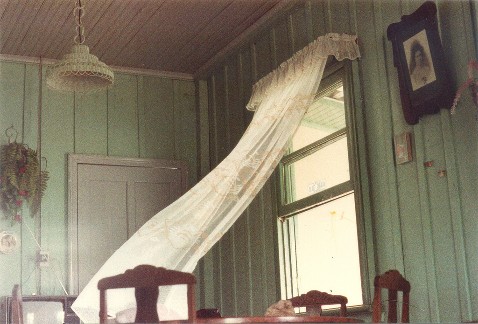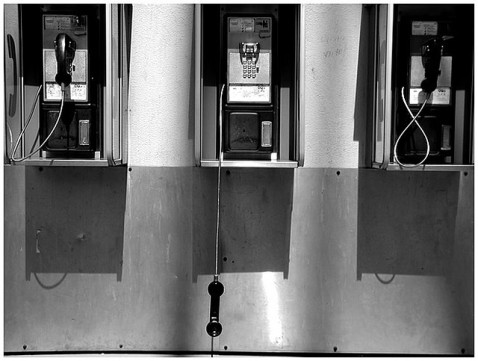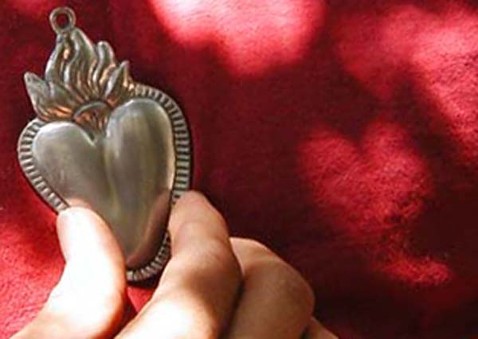The growl cuts through our nighttime routine.
Beezus and I stop, my heart beating wildly at a sudden, unnoticed danger. We glance at each other then the dog, then at the direction the dog is staring, poised in attack mode. Blackness envelopes the children's bedroom, and the dog stands just outside the door. The hair on the scruff of his neck is raised. As the dog bares his teeth again, my daughter scurries behind my legs.
"Mommy, the dog is barking at a people."
"Honey, there are no other people in our house. It is night. We are the only ones."
"Mommy, the dog is barking, because he is scared because we are the only people."
It was the perfect night for ghosts. You know, in the most clichéd of ways, it truly was a dark and stormy night. The wind rattled our windows. Ominous had been defining my mood for weeks. The chill of a harsh January winter had taken residence deep within me. I was waiting for something to happen. My husband was pulling an overnight shift at the hospital, and I was too pregnant with my son to fight a break-in. I stared into the dark room allowing my eyes to adjust to the light.
Oh, please just let it be a ghost. Please let it be her.
I tiptoed gently into the room, the dog staunch and rigid at my right leg, the girl behind my left leg. And my eyes rest on a balloon hovering at person height, not quite enough helium to stretch to the ceiling, and not empty enough to fall to the floor.
I know how you feel, balloon.
I swat the balloon into the corner. "It is only your balloon, love, scaring the dog because it looks like a people." And I walked back sullenly. Why wasn't it Spectral Lucy? It is so terribly sad to yearn for my dead daughter to haunt our house, slam doors, drop papers, blow the curtains around when there is no wind. I want her to rock on the antique chair my mother-in-law gave us for the late night feedings.

photo by Paulo Brabo
Sometimes in the most earthly, normal way, I get a whiff of my grandfather--that distinctive crotchety old guy bouquet of overly applied cologne with overly applied aftershave mixed with some Bengay and peppermints. I will be reading a book and the smell of him will drift through the room, like he just walked into the room asking me to check the score of the game. And I don't care if my memory neurons just misfired, or if my old neighbor with a penchant of Old Spice just walked by our house, I take the moment to sit with my dead grandfather for a moment.
Hello, Pop. I miss you.
:::
"Mama, Lucy is stuck behind the red couch!"
My head shoots upward from my crumpled, intense, and near-sighted writing position. I stare at the door. I am immediately rigid in my office chair, as though I have been injected with very cold water right into my spine. Then I look back at my computer screen again, rereading the paragraph I had just written.
Please let her be stuck here, I think. Maybe in that space between the couch and the wall. I could kneel on the cushion and peek into that spot, 'Hello, love,' I would say. 'I miss you.'
I was working on the final edit of my last post Milagros while Thor napped and Beezus played. I wasn't quite sure how I wanted that paragraph to read, but I could visualize myself kneeling on our red couch, next to the antique secretary where Lucy's ashes sit in an urn, peering over the back of the couch, whispering to my dead daughter, "We are leaving now, love. Be back soon." As soon as we'd get home, I'd make a cup of tea, tell her about our day. It would be like having a portal to Lucy behind the couch, because I never did the rosary for her.
"Mama, Lucy is really stuck behind the couch!"
I am a rational woman. A cynic mostly. Someone who wrestles with my belief in God and in the afterlife. I sometimes believe in a little of everything and, other times, in absolutely nothing at all. I am the kind of person that devoted her entire undergraduate degree to studying religion and still consulted a five dollar psychic to find out what happened to my daughter's soul after she was stillborn. I desperately want to believe that the things that go bump in the night are my daughter, but I mostly find balloons where ghosts ought to be.
"Mama, Lucy is really really stuck behind the couch. Come quick."
I don't know her. I don't know what color eyes she would have, what room was her favorite. I don't know what perfume she would have chosen for herself, or what chair would have been her favorite. I have no sense of who she would have been. I construct who I thought she was in my head, but as I watch my six month old son grow, it reminds me that even the things I did know about her would have changed, like her eye color and hair and her perfect little nose. So, now it feels like I don't know anything about her except that she died in me.
I mourn getting to know her well enough to sense her presence. Like my grandfather, I want to smell her spirit when the right combination of memory neurons fire. But Lucy is just a blank hole, a girl-shaped cut-out in my memory. The negative space of Lucy would have been filled if she had breathed or laughed. It was a room in my heart and brain that I saved for just her. I lack the ability to imagine a newborn ghost as anything but a tiny thing that couldn't lift its own head, let alone walk the halls at night. Maybe that is what I would ask a prophet or psychic or the Oracle of Delphi, can you talk to the stillborn? Can you have a real conversation if they only gurgled if they lived? Can a stillborn child haunt your house? Can she fly through your hallways and slam doors and blow out candles and scare the dog? And if she can, can you ask my daughter to haunt me?
"Mama! Lucy is stuck! I can't reach her."
I try not to focus on signs, and ghosts, and hauntings, and yet, God, I want Lucy to haunt my house. Far beyond scaring me, that would comfort me, wrap me in warmness. I would call to her. I would whisper to her. I would find myself photographing dark rooms searching for one tiny orb of Lucy and post it to the family along with the pictures of the other children with ice cream smeared across their face. I would get to know her. "There's Lucy." I would point to the photograph. "She loves that rocking chair and the smell of candles blown out."
I walk tentatively into the front room. I am savoring the moments of having my daughter call to me about Lucy. Just hearing her name said without tears and heartbreak some days is enough. As I walk closer, I grow afraid, suddenly, of finding her urn behind the couch, something that only occurs to me as I walk into the room and find Beezus kneeling on the red couch, peering over the back. It is the same exact position I had just written myself into a few moments before.
"Lucy is stuck, Mama." And her little finger gestures behind the couch as she blinks back tears in the over-exaggerated emotion of a toddler separated tragically from her favorite doll. I see the rest of our peg family lying all over the couch, except Lucy.
This is the moment I crave, the one I just wrote about, having her here with us in spirit, feeling her ghost in our daily lives, having a portal to Lucy. Maybe Spectral Lucy forced the Lucy doll down there, just so I would know. Maybe she is watching after all. I stop myself and look around for her. I sniff the air. Listen for the wind chimes. It is so ordinary a moment I doubt the extraordinary-ness of it. I wait for the punctuation mark that never comes. I feel nothing but massive coincidence, even though all these weeks later, I can't quite shake it. The Lucy moment passed, if there ever was one, and I am back to being a toddler mama reaching a little peg doll from behind the couch.
I saved Lucy. That is the thing about naming inanimate objects your dead daughter's name, you get the extraordinary task of saving them, putting them to bed, depending on how maternal your toddler is, or just saying her beautiful name in regular life without cringing. Beezus ran off again in the other direction talking to her peg family about their adventure of being stuck behind the couch. I think about the paragraph on the computer again, lean over the back of my couch and close my eyes.
"Hello, my love," I whisper. "I miss you."
Do you believe in other-worldly encounters? Have you ever had any ghostly or supernatural experiences with your child? Do you feel your child around you? Have you ever had any extraordinary experiences in your grief that have comforted you? What kind of signs do you crave from the other world?





